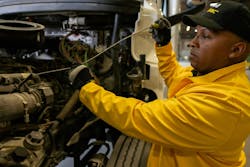ExxonMobil wants to help feed 1 million kids through extended engine oil program
Engine oils play a big role in improving both fuel efficiency and engine life, and by extension, keeping vehicles on the road for the long-term. To emphasize this while helping the community, ExxonMobil launched the Unstoppable Care-avan program, a summer initiative to donate one million meals to children through No Kid Hungry.
The rules are simple: Authorized Mobil Distributors must get a fresh Mobil Delvac oil change, then hit the road. Then, “for each mile that they drive, we donate to No Kid Hungry,” explained Melissa Diorio, field marketing manager for ExxonMobil.
Eleven distributors across the country are currently participating, with a variety of trucks and engines to their name. For instance, Brenntag Lubricants out of Houston, Texas, is using Freightliner Cascadia Tandem Axle tractors with Detroit engines filled with Mobil Delvac 1300 Super 10w-30, while Stern out of South Dakota is using Mobil Delvac 1 ESP 5W-40 in three different truck configurations. Others still are using International trucks, Peterbilts, Freightliner Cascadias, and Western Star vehicles. As long as they don’t get another oil change during the campaign, their miles go towards funding No Kid Hungry. According to Diorio, the idea is to emphasize how using the proper engine oils saves fleets both money and time.
“In some cases, that might mean making more deliveries and increasing their profits,” she said. “And in some cases that may mean that they have more uptime to give back in their local communities and get involved with charities like No Kid Hungry.”
Extending engine oil life
Any truck operator should refer to their specific OEM guidelines for oil change frequencies, and developing an oil sampling program can help determine if oil changes should be completed sooner. ExxonMobil offers this through its Mobil Lubricant Analysis.
“It can really help see what's going on with your oil and even help predict maintenance issues before they happen,” Diorio noted. “We recommend oil analysis for all of our commercial and industrial applications. In fact, it's a widely used practice for more of the industrial and off-highway construction sectors that we serve.”
That's all to ensure your engine has the appropiate lubrication to promote efficiency and prevent wear and tear. To get the most miles between oil change intervals and thus get more kids fed throught the program, Unstoppable Care-avan participants also need to keep an eye out for factors that can shorten an engine oil’s lifespan. These includes contamination and lubricant breakdown, according to Michael Miltenberger, senior lubrication engineer at ExxonMobil.
Read more: Making your fleet more adaptable with oil analysis
“Contamination can be caused by fuel dilution, coolant contamination, or dirt or particles getting into the oil,” Miltenberger stated. “Breakdown of the lubricant is usually oxidation due to heat or over extended drain interval, or poor quality base stock or additives in the lubricant.”
Read more: The future of heavy-duty engine oils: leaner and cleaner
Fuel dilution and coolant contamination can also cause oil to break down too soon, he continued. To avoid this, “Fuel injectors and the cooling system need to be checked and maintained to ensure proper operation.”
According to the field marketing manager, ExxonMobil has been able to catch between 5-20% of unplanned maintenance events before they occur through their oil analysis.
Additionally, fleets should analyze their maintenance practices and goals to identify which combination of lubricant and additive to use. Some example factors are lubricant costs or extended drain capabilities or a fleet’s sustainability goals.
“By complementing a Mobil Delvac engine oil with the right transmission fluids and greases, that can really help to improve operating conditions of the engine,” Diorio explained.
But finding the right engine oil also means having a good eye for quality and looking beyond marketing terms that can be deceiving. Reputable, name-brand products are a good place to start, Miltenberger said.
“These products typically have approvals listed on the oil container, and performance and approvals can be verified via the website of the OEM of the equipment,” the sr. lubrication engineer noted.
Another good source to check is the owner’s manual for the engine, which can include the necessary grade and spec of oil. After that, technicians should be sure to cross-reference their findings with the OEM’s list or product data sheet, Miltenberger concluded.
With these tips in mind, fleets can keep their engines up to par, and Unstoppable Care-avan participants can make a difference in kids’ lives.
About the Author

Alex Keenan
Alex Keenan is an Associate Editor for Fleet Maintenance magazine. She has written on a variety of topics for the past several years and recently joined the transportation industry, reviewing content covering technician challenges and breaking industry news. She holds a bachelor's degree in English from Colorado State University in Fort Collins, Colorado.

